Related Research Articles

West Pakistan was the western polity of Pakistan, it was one of the two provincial exclaves created under the One Unit Scheme in 1955 in Pakistan. It was created to ensure population-based equality with its eastern counter-part and it was dissolved to once again form former provinces for the General Elections in 1970 under the 1970 Legal Framework Order.

Liaquat Ali Khan was a Pakistani lawyer, politician and statesman who served as the first prime minister of Pakistan from 1947 until his assassination in 1951. He was one of the leading figures of the Pakistan Movement and is revered as Quaid-e-Millat.

The All-India Muslim League (AIML) was a political party established in Dhaka in 1906 when some well-known Muslim politicians met the Viceroy of British India, Lord Minto, with the goal of securing Muslim interests on the Indian subcontinent.

The Intelligence Bureau is a civilian intelligence agency in Pakistan. Established in 1947, the IB is Pakistan's oldest intelligence agency. DG IB is a 4 star equivalent rank of the BPS apex scale in Pakistan. Appointments and supervision of its operations are authorized by the Prime Minister of Pakistan.
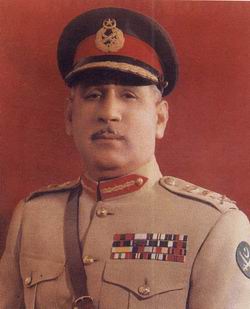
Tikka Khan was a Pakistan Army general who served as the first chief of the army staff from 1972 to 1976. Along with Yahya Khan, he is considered a chief architect of the 1971 Bangladesh genocide which according to independent researchers led to the deaths of 300,000 to 500,000 people.

Begum Ra'ana Liaqat Ali Khan was the First Lady of Pakistan from 1947 to 1951 as the wife of Liaquat Ali Khan who served as the 1st Prime Minister of Pakistan. She was also the first female and tenth governor of Sindh. She was one of the leading woman figures in the Pakistan Movement, and a career economist, and prominent stateswoman from the start of the cold war till the fall and the end of the cold war.
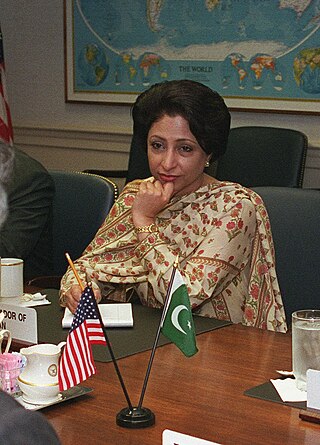
Maleeha Lodhi is a Pakistani diplomat, political scientist, and a former Pakistan's Representative to the United Nations. She was the first woman to hold the position. Previously, she served as Pakistan's envoy to the Court of St James' and twice as its ambassador to the United States.

The Praja Socialist Party, abbreviated as PSP, was an Indian political party. It was founded when the Socialist Party, led by Jayaprakash Narayan, Rambriksh Benipuri, Acharya Narendra Deva and Basawon Singh (Sinha), merged with the Kisan Mazdoor Praja Party led by J. B. Kripalani.
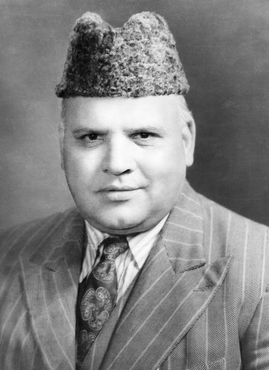
Khan Abdul Qayyum Khan Kashmiri was a major figure in British Indian and later Pakistan politics, in particular in the North-West Frontier Province, where served as the deputy speaker of the provincial assembly, first Chief Minister of North-West Frontier Province and served as Interior Minister of Pakistan in the central government from 1972 to 1977.
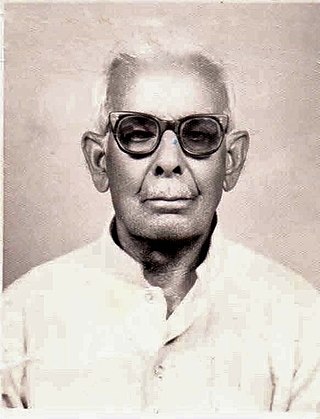
Dada Amir Haider Khan was a communist activist of Pakistan, and revolutionary during the Indian independence movement.
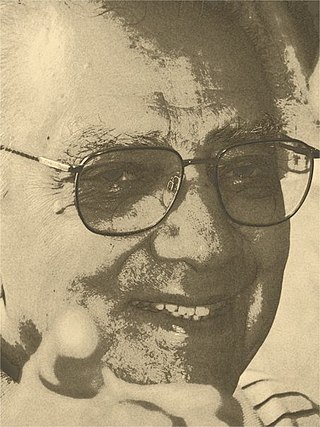
Abid Hassan Minto also known as Abid Minto is a constitutional expert and senior lawyer of the Supreme Court of Pakistan, and former president of the Awami Workers Party. He is also a literary critic and a leftwing civic and political leader. His legal career spans over 50 years during which he was elected member of the Pakistan Bar Council from 1966 up to 1983; President, Lahore High Court Bar Association (1982); Chairman, National Coordination Committee of Lawyers and President, Supreme Court Bar Association of Pakistan (SCBA).
The Asian Socialist Conference (ASC) was an organisation of socialist political parties in Asia that existed between 1953 and 1965. It was established in an effort to build a Pan-Asian multinational socialist organization, clearly independent from earlier European colonial centers, yet free from the new superpowers of the Cold War. Until 1963 its headquarters was in Rangoon, Burma; the first chairman and treasurer of the conference were the Burmese socialist leaders Ba Swe and Kyaw Nyein respectively. As of 1956, the member parties of ASC had a combined membership of about 500,000. In total, four Asian Socialist Conferences convened: Rangoon, 1953 and 1954, and Bombay, 1956 and 1965.

The Socialist Party of Greece was a political party in Greece. The party was formed in 1920, as an anti-Comintern minority split away at the second congress of the Socialist Labour Party of Greece. The group that founded the Greek Socialist Party was led by A. Sideris. The party was active in trade unions, and in 1931 the leading party member Dimitris Stratis was elected General Secretary of the General Confederation of Greek Workers (G.S.E.E.).
The Greek Socialist League was a socialist organization in Greece. The Socialist Party of Greece had merged with the Democratic Party, forming the Democratic Party of Working People, in September 1953. The Socialist League was founded on December 6, 1953, as a platform for socialist politics inside the new party. It did not consider itself a political party as such, but rather an organized faction. It published the journal Sosialistika fylla.
The Socialist Union of Central-Eastern Europe was a coalition of émigré social democratic parties from Eastern Europe during the Cold War years. SUCEE had its headquarters in London. The 1959 Hamburg conference of SUCEE proclaimed as the goals of the organization to struggle for national independence, multiparty democracy, the right to organize trade unions, and against 'Russification' of any kind. The organization published the bulletin Labour's Call from Behind the Iron Curtain.

Sardar Amir Azam was a Pakistani politician and entrepreneur. Azam was a cabinet minister during the 1950s and was the pioneer of low cost housing in Pakistan. He initially emerged in 1951 as an M.C.A. in the very first Pakistani Government headed by Mr. Liaquat Ali Khan, and later re-emerged as the Minister of State and the Central Minister, several times in the succeeding Pakistani Governments. He held multiple portfolios simultaneously. He is buried at Garhi Afghanan,near Taxila, his ancestral graveyard.
The influences of socialism and socialist movements in Pakistan have taken many different forms as a counterpart to political conservatism, from the groups like The Struggle, Lal Salam which is the Pakistani section of the International Marxist Tendency, to the Stalinist group like Communist Party through to the reformist electoral project enshrined in the birth of the Pakistan Peoples Party (PPP).
Socialist Weekly was an Urdu language newspaper published from Karachi, Pakistan. Socialist Weekly was launched in late 1947 as a continuation of the Sindhi Socialist Weekly. Socialist Weekly carried the symbol of the Indian Socialist Party in its masthead. It became the official organ of the Pakistan Socialist Party when the party was constituted in January 1948. The original editorial board consisted of Mobarak Sagher, Munshi Ahmad Din, Siddique Lodhi, Ram Mohan Sinha, Kali Charan and Mohammed Yusuf Khan. Socialist Weekly had a circulation of around 2,500.
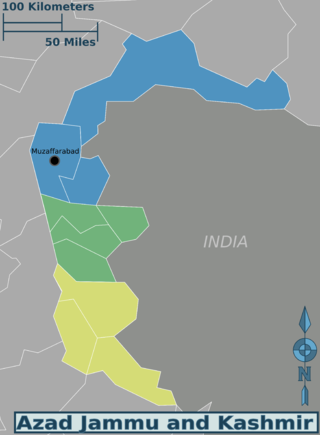
In Spring of 1947, an uprising against the Maharaja Hari Singh of Jammu and Kashmir broke out in the Poonch jagir, a region bordering the Rawalpindi district of West Punjab and the Hazara district of the North-West Frontier Province. The rebellion was initiated by a "No-tax campaign" and by the news of the 1947 Jammu massacres which angered the locals who were veterans of the Second World War to take up arms. The leader of the rebellion, Sardar Muhammad Ibrahim Khan, escaped to Lahore by the end of August 1947 and persuaded the Pakistani authorities to back the rebellion. This rebellion eventually led to the First Kashmir War fought between India and Pakistan. The Poonch jagir has since been divided across Azad Kashmir, administered by Pakistan and the state of Jammu and Kashmir, administered by India.

Lieutenant-General Farooq Shaukat Lodhi, best known as F.S. Lodhi, was a Pakistani public official and military officer who served as the Governor of Punjab and Balochistan in 1984, and later serving as the Interior Minister in Zia administration in 1985..
References
- ↑ Doherty 2006 , p. 304
- ↑ Rose 1959 , pp. 59–60, 64
- 1 2 Rose 1959 , p. 67
- ↑ Doherty 2006 [ page needed ]
- ↑ Braunthal, Julius (ed). Yearbook of the International Socialist Labour Movement. Vol. II. London: Lincolns-Prager International Yearbook Pub. Co, 1960. p. 45
- ↑ Rose 1959 , p. 60
- 1 2 3 4 Rose 1959 , pp. 61–62
- ↑ Braunthal, Julius (ed). Yearbook of the International Socialist Labour Movement. Vol. I. London: Lincolns-Prager International Yearbook Pub. Co, 1957. pp. 415, 417
- ↑ Braunthal, Julius (ed). Yearbook of the International Socialist Labour Movement. Vol. I. London: Lincolns-Prager International Yearbook Pub. Co, 1957. p. 414
- ↑ Rose 1959 , pp. 62–63
- 1 2 3 4 5 6 Rose 1959 , pp. 65–66
- ↑ Khursheed Kamal Aziz. Party Politics in Pakistan, 1947-1958 . Sang-E-Meel Publications, 2007. p. 118
- ↑ Doherty 2006 , p. 305
- Doherty, James C., ed. (2006). Historical Dictionary of Socialism (PDF). Historical dictionaries of religions, philosophies, and movements, no. 73. Scarecrow Press. ISBN 0-8108-6477-0. OCLC 299166800. Archived from the original (PDF) on 10 July 2011.
- Rose, Saul (1959). Socialism in Southern Asia. London: Oxford University Press. OCLC 2862247.